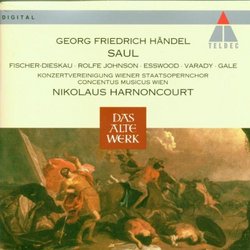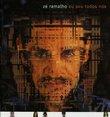| All Artists: George Frideric Handel, Nikolaus Harnoncourt, Dietrich Fischer-Dieskau, Julia Varady, Concentus Musicus Wien, Konzertvereinigung Wiener Staatsoperchor, Elizabeth Gale, Anthony Rolfe Johnson, Paul Esswood, Matthias Holle Title: Handel - Saul / Fischer-Dieskau · Rolfe Johnson · Esswood · Varady · Gale · Harnoncourt Members Wishing: 0 Total Copies: 0 Label: Elektra / Wea Release Date: 7/18/1995 Genre: Classical Styles: Opera & Classical Vocal, Historical Periods, Baroque (c.1600-1750) Number of Discs: 2 SwapaCD Credits: 2 UPC: 745099750428 |
Search - George Frideric Handel, Nikolaus Harnoncourt, Dietrich Fischer-Dieskau :: Handel - Saul / Fischer-Dieskau · Rolfe Johnson · Esswood · Varady · Gale · Harnoncourt
 | George Frideric Handel, Nikolaus Harnoncourt, Dietrich Fischer-Dieskau Handel - Saul / Fischer-Dieskau · Rolfe Johnson · Esswood · Varady · Gale · Harnoncourt Genre: Classical
|
Larger Image |
CD DetailsSimilar CDs
|
CD ReviewsDietrich Fischer-Dieskau 'is' Saul E. A. Lovitt | Gladwin, MI USA | 07/25/2010 (5 out of 5 stars) "I own two copies of Händel's oratorio, "Saul," the 2005 harmonia mundi edition conducted by René Jacobs (the RJ edition) Handel: Saul, and the 1985 Das Alte Werk (Teldec) edition conducted by Nikolaus Harnoncourt (the NH edition). I thought the best way to review the NH edition would be to compare it to the better-known RJ edition.
The Old Testament story of King Saul is one of numerous Handel oratorios that I would love to see staged. In fact, "Saul...contains extremely precise stage directions which were printed in the wordbooks distributed at [the original] performances." (quoted from the RJ insert). Handel wanted his audience to be able to visualize the action that was not taking place on stage, but was vividly reconstructed in his music. There are several cuts in the NH version, a live recording (Vienna Musikvereinssaal, 04/28/1985), which runs for 2 hours 15 minutes 54 seconds. The RJ studio version runs for 2 hours 30 minutes. Most of the cuts are taken from the symphonies which tend to run half as long in the NH version. For instance the timing for the opening symphony in the NH version is 4 minutes. In the RJ version, it is 8 minutes long. The High Priest's arias and many of his recitatives are also cut from the NH version. Even though René Jacobs is a respected interpreter of Baroque music, I thought his "Saul" was rather scholarly and flat compared to Nikolaus Harnoncourt's more colorful, operatic rendition. From the arrogant blat of the trombones introducing the first chorus ("How excellent thy name, oh Lord"), through the impudent bell-tones of the Israelite women's chorus ("Welcome, welcome, mighty king!") that triggers Saul's jealous rage against David, to the solemn "Dead March" and David's anguished "O Jonathan! How nobly didst thou die..." I found the NH version more vivid and emotionally in tune with the tragedy of Saul and his son Jonathan. Of course, it helps that the NH recording includes some outstanding operatic voices, including Dietrich Fischer-Dieskau as Saul, and Julia Varady (F-D's wife) as his haughty daughter, Merab. The RJ voices are lovely and more evenly balanced, but NH's Fischer-Dieskau 'is' Saul. Do not expect the lyric baritone of his early and middle career. His voice sounds cavernous and barely under control in this recording, but his musicianship and technique are flawless. The two problems with the NH recording are (1) the cuts; and (2) the distinctive, brazen tenor of Helmut Wildhaber is overused in five different roles, from the Witch of Endor to the High Priest. When I first started listening to this recording of "Saul" it was difficult to understand why the Witch of Endor shows up a few minutes later to announce that he is the Amalekite, who killed Saul. I wouldn't give up either of these recordings of Handel's "Saul" but I do prefer Nikolaus Harnoncourt's interpretation. " |

 Track Listings (29) - Disc #1
Track Listings (29) - Disc #1